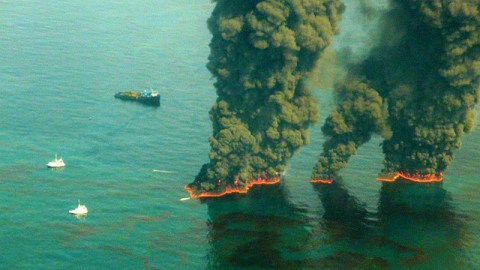I am taking a couple of weeks off. But while I’m away, I thought I’d share with you some of the what I consider to be this year’s essential readings on politics. Today, I want to look at the oil spill and climate change legislation.
The first place to start is “Building a Green Economy” (The New York Times, April 5), Paul Krugman’s even-handed primer on the economics of climate change.
In fact, once you filter out the noise generated by special-interest groups, you discover that there is widespread agreement among environmental economists that a market-based program to deal with the threat of climate change—one that limits carbon emissions by putting a price on them—can achieve large results at modest, though not trivial, cost. There is, however, much less agreement on how fast we should move, whether major conservation efforts should start almost immediately or be gradually increased over the course of many decades.
There’s no real question that the earth is warming as a result of human activity, with potentially serious or even catastrophic consequences. The real debate is over what we should be doing about it. In “Why the Decision to Tackle Climate Isn’t as Simple as Al Gore Says” (The New Republic, June 22), Jim Manzi argues that full-scale efforts to slow climate change could cost more than they’re worth.
Prior to consideration of the more detailed economic issues—e.g., costs versus benefits of attempts to forestall the problem; the danger of worse-than-expected outcomes, etc.—pause to recognize that according to the IPCC the expected economic costs of global warming under the plausible scenarios for future economic growth are likely to be about 3 percent of GDP more than 100 years from now. This is pretty far from the rhetoric of global destruction and Manhattan as an underwater theme park.
“Is Climate Change Worth Tackling?” (The New Republic, July 5) is Bradford Plumer’s response to Manzi. Plumer argues that Manzi underestimates both the risk of catastrophic disaster and the overall impact of climate change.
True, a 3 percent drop in global GDP may not sound so bad. We’ll all be much richer in 2100, we can take a hit. But that top-line figure can obscure some serious distributional issues. Climate change, after all, is expected to hit developing countries much harder than wealthier ones. And as Nate Silver
once noted, you could completely wipe out the poorest 81 nations in the world, with a total population of 2.8 billion, and the blow to global GDP would “only” be about 5 percent.
In “The Spill, the Scandal and the President” (Rolling Stone, June 8), Tim Dickinson recounts the fascinating and appalling story of what went wrong at the Deepwater Horizon rig, and how BP and the Obama administration tried to minimize the spill rather take the necessary efforts to deal seriously with it.
Like the attacks by Al Qaeda, the disaster in the Gulf was preceded by ample warnings—yet the administration had ignored them. Instead of cracking down on MMS, as he had vowed to do even before taking office, Obama left in place many of the top officials who oversaw the agency’s culture of corruption. He permitted it to rubber-stamp dangerous drilling operations by BP—a firm with the worst safety record of any oil company—with virtually no environmental safeguards, using industry-friendly regulations drafted during the Bush years. He calibrated his response to the Gulf spill based on flawed and misleading estimates from BP—and then deployed his top aides to lowball the flow rate at a laughable 5,000 barrels a day, long after the best science made clear this catastrophe would eclipse the Exxon Valdez.
Finally, if you haven’t seen them already, it’s worth looking at Charlie Riedel’s powerful photos of animals caught in an oil slick off Louisiana’s East Grand Terre Island.





